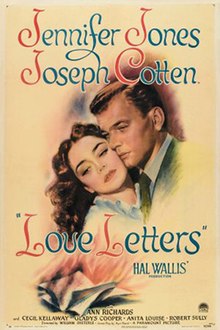| Revision as of 05:03, 7 March 2010 editCydebot (talk | contribs)6,812,251 editsm Robot - Moving category Black and white films to Black-and-white films per CFD at Misplaced Pages:Categories for discussion/Log/2010 February 25.← Previous edit | Revision as of 00:59, 29 May 2010 edit undoMedeis (talk | contribs)Extended confirmed users49,187 edits →Plot summaryNext edit → | ||
| Line 22: | Line 22: | ||
| ==Plot summary== | ==Plot summary== | ||
| Alan Quinton (]), a soldier in ] during ], has been writing letters for his friend Roger Morland (]), a man who admits he "never had any standards, manners or taste." |
Alan Quinton (]), a soldier in ] during ], has been writing letters for his friend Roger Morland (]), a man who admits he "never had any standards, manners or taste." Quinton has never met Victoria Remington, but regards her as a "] of the spirit," to whom he can express feelings he's never expressed in person. He realizes that Victoria has fallen in love with the letters and is concerned that Victoria will be disappointed by the real Roger. | ||
| ] | ] | ||
Revision as of 00:59, 29 May 2010
1945 American film| Love Letters | |
|---|---|
 Promotional movie poster for the film Promotional movie poster for the film | |
| Directed by | William Dieterle |
| Written by | Ayn Rand |
| Produced by | Hal B. Wallis |
| Starring | Jennifer Jones Joseph Cotten Ann Richards Cecil Kellaway Gladys Cooper Anita Louise |
| Cinematography | Lee Garmes |
| Edited by | Anne Bauchens |
| Music by | Victor Young |
| Distributed by | Paramount Pictures |
| Release date | August 17, 1945 |
| Running time | 101 min. |
| Country | USA |
| Language | English |
Love Letters is a 1945 film adapted by Ayn Rand from the novel Pity My Simplicity by Christopher Massie. It was directed by William Dieterle and stars Jennifer Jones, Joseph Cotten, Ann Richards, Cecil Kellaway, Gladys Cooper and Anita Louise.
The movie was nominated for Academy Awards for Best Actress in a Leading Role (Jennifer Jones), Best Art Direction-Interior Decoration, Black-and-White (Hans Dreier, Roland Anderson, Sam Comer, Ray Moyer), Best Music, Scoring of a Dramatic or Comedy Picture and Best Music, Song (Victor Young and Edward Heyman for "Love Letters").
Plot summary
Alan Quinton (Joseph Cotten), a soldier in Italy during World War II, has been writing letters for his friend Roger Morland (Robert Scully), a man who admits he "never had any standards, manners or taste." Quinton has never met Victoria Remington, but regards her as a "pin-up girl of the spirit," to whom he can express feelings he's never expressed in person. He realizes that Victoria has fallen in love with the letters and is concerned that Victoria will be disappointed by the real Roger.
When he returns home, Alan learns that Roger has died. When he tries to look up Victoria he is told that she has also died, and he learns that Roger's death was a murder. At a party he meets and falls in love with a mysterious woman named Singleton (Jennifer Jones), who may hold the key to these deaths, but is suffering from amnesia. The subsequent plot follows Singleton's effort to regain her past, and Alan's efforts to find out what the real story of the murder was.
Cast
- Jennifer Jones - Singleton / Victoria Morland
- Joseph Cotten - Allen Quinton
- Ann Richards - Dilly Carson
- Cecil Kellaway - Mac
- Gladys Cooper - Beatrice Remington
- Anita Louise - Helen Wentworth
- Robert Sully - Roger Morland
- Reginald Denny - Defense counsel Phillips
- Ernest Cossart - Bishop
- Byron Barr - Derek Quinton
References
- "NY Times: Love Letters". NY Times. Retrieved 2008-12-19.
External links
| Ayn Rand | |||||||||||||||
|---|---|---|---|---|---|---|---|---|---|---|---|---|---|---|---|
| Bibliography |
| ||||||||||||||
| Adaptations |
| ||||||||||||||
| Philosophy | |||||||||||||||
| Influence | |||||||||||||||
| Depictions | |||||||||||||||